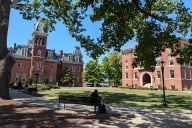You have /5 articles left.
Sign up for a free account or log in.

Rick Snyder, the Republican former governor of Michigan, told Harvard University he won’t be heading there for a fellowship after all. His announcement Wednesday follows days of vocal opposition to Snyder’s appointment to the Taubman Center for State and Local Government as a senior research fellow.
Snyder’s critics cited his response -- or lack thereof -- to the Flint, Mich., water crisis during his governorship, from 2011 to 2019.
"It would have been exciting to share my experiences, both positive and negative; our current political environment and its lack of civility makes this too disruptive," Snyder said on Twitter. "I wish them the best."
In an email to Harvard’s Kennedy School, Douglas Elmendorf, the school's dean, wrote that Snyder withdrew from his fall fellowship and that “we and he now believe that having him on campus would not enhance education here in the ways we intended.”
Flint’s population, “especially low-income black residents,” he said, has “suffered acutely because of their poisonous water supply and I have been deeply moved by the personal and thoughtful messages I have received from people in Flint.”
In 2017, Elmendorf made a similar announcement regarding the appointment of convicted Wikileaks source Chelsea Manning as a visiting fellow to the Kennedy School. While Snyder backed out, however, Manning’s fellowship was rescinded. She was still invited to talk on campus, Elmendorf said at the time, but was not right for the perceived honorific of fellow.
Going forward, he said, “I think we should weigh, for each potential visitor, what members of the Kennedy School community could learn from that person’s visit against the extent to which that person’s conduct fulfills the values of public service to which we aspire. This balance is not always easy to determine, and reasonable people can disagree about where to strike the balance for specific people.” (Manning at the time commented that being disinvited was a distinction in itself.)
Sean Spicer, a former Trump administration White House press secretary, also in 2017 faced opposition to his appointment as a fellow in the Kennedy School’s Institute of Politics. But Harvard never rescinded the job or title, and Spicer didn't back out. Corey Lewandowski, President Trump's former campaign manager, was a fellow there around the same time. Snyder's job as senior research fellow, which was to begin this week, would have been much more involved than spending a few days on campus as a visiting fellow, however.
Harvard isn't the only institution to name divisive fellows. The University of Virginia's Miller Center, for instance, named Marc Short a fellow when he was still serving as Trump's director of legislative affairs. Some of the loudest opposition to the 2018 appointment came from faculty members within the center, who said Short was still too close to a too-controversial presidency to be an effective colleague.
Short stepped down from the part-time Virginia job after six months, to work as Vice President Mike Pence's chief of staff.
Harvard announced Snyder’s appointment last Friday. Jeffrey Liebman, Malcolm Wiener Professor of Public Policy and director of the Taubman Center, in an announcement touted Snyder’s "significant expertise in management, public policy and promoting civility."
Snyder said he looked forward “to sharing my experiences in helping take Michigan to national leadership in job creation, improved government performance and civility.”
The notice made no mention of Flint, and soon scholars were encouraging each other to write to Liebman in protest. They and other critics pointed out that a 2018 report co-written by professors at the University of Michigan’s School of Public Health found that Snyder "bears significant legal responsibility" for the crisis "based on his supervisory role over state agencies." They also underscored the fact that Snyder’s phone was seized a month ago as part of an ongoing investigation into what happened in Flint. (Snyder has responded to related news reports as "sloppy and misleading," saying that he turned in his state phone and "all that stuff" to Michigan's attorney general before he left office.)
Tiffani Bell, who runs a nonprofit group called the Human Utility for water bill assistance in Michigan and served as a 2017 Technology and Democracy Fellow at the Harvard’s Ash Center for Democratic Governance and Innovation, also started a petition to rescind the appointment. “Flint residents were actually expected to pay water bills for water they couldn’t and shouldn’t drink,” the petition reads. “To add further insult to injury, Snyder allowed the state of Michigan to stop providing bottles of water free of charge to families dependent on Flint’s polluted water.”
Liebman did not respond to a request for comment at the time, but he wrote directly to some of his critics in emails that have been circulated online. This time, he acknowledged Flint and the need to study good and bad policy making.
“The abject failures of governance that caused such terrible harm to residents of Flint raise profound questions about public policy and administration, and especially about the interaction of racial justice and public-sector decision making,” he said in one email. He assured the reader that Snyder would face “hard questions” during his time on campus.
Now, of course, he won’t -- at least not at Harvard.









